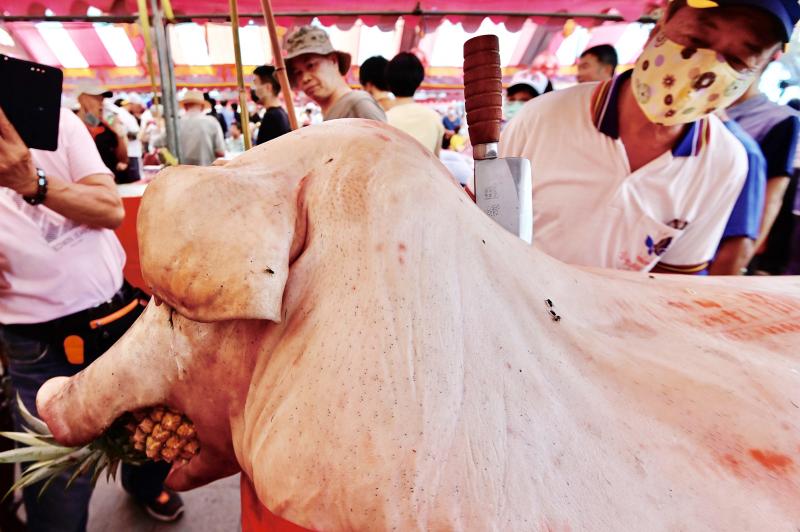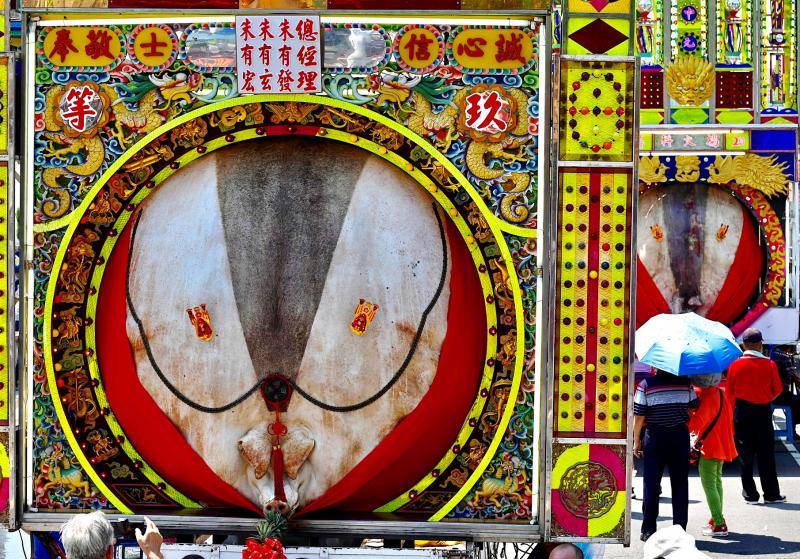A festival where enormous pigs are slaughtered and displayed is drawing smaller crowds as animal rights activists alter perceptions of the controversial tradition.
The annual ritual is a cultural cornerstone for the nation’s Hakka community, who make up about 15 percent of the population. But it has long been a polarizing custom.
Local Hakka families compete to display the largest pig, with the winner taking home a trophy.

Photo: AFP
To a fanfare of traditional music played on gongs and horns, 18 slaughtered pigs were wheeled out on trucks Monday into the Hsinpu Yimin Temple in Hsinchu County .
The heaviest weighed a whopping 860kg — three times the average adult swine. The carcasses, bristles shaved and pinned with decorations, were displayed upside-down, the heads with pineapples stuffed in their mouths, dwarfed by their bloated torsos.
After the festival, the carcasses are taken home by their owners and the meat distributed to friends, family and neighbors.

Photo: AFP
Tseng Jia-yun’s family spent three years fattening up their pig, which was slaughtered last week weighing 400kg.
The sacrifice fulfilled the wishes of his 86-year-old grandmother.
“As a Hakka, I am proud of this divine pig culture, it’s worth preserving,” he said, describing the concerns of animal rights groups as “nonsense.”
“There’s no cruelty to animals, contrary to the rumors being spread around,” he added.
OUTDATED RITUAL?
Animal rights campaigners disagree.
They say the heaviest pigs are force fed, often in small cages to the point where the morbidly obese animals are unable to get up.
The pigs are so heavy that they can’t even stand,” said Lin Tai-ching (林岱瑾), director of the Environment and Animal Society of Taiwan.
Lin has been documenting the “holy pig” festival for the last 15 years and says attitudes are beginning to change.
Crowds have begun to thin and the number of sacrifices has fallen dramatically.
“Fifteen years ago there were more than 100 swine in the contest, compared to 37 this year,” she said.
The number of animals over 600kg had also plummeted, she added.
Two submissions this year were made up of rice packets displayed in the shape of a pig, a sign that some participating families are rejecting animal sacrifices.
Researchers and locals say that while the festival dates back centuries, the tradition of sacrificing fattened pigs is a more recent phenomenon.
The Hakka are one of the many ethnic groups from China who settled in Taiwan over the last few hundred years. Each summer the Hsinpu Yimin Temple commemorates a group of Hakka who died defending their villages during a period of political upheaval in the late eighteenth century.
However, it was during Japan’s colonial occupation of Taiwan in the early twentieth century that the sacrificing of fattened pigs became a commonplace part of the celebrations. The custom then became turbocharged in the 1980s and 1990s with the pigs getting bigger and bigger.
“The Yimin festival is to honor our ancestors who died defending our homeland, a display of loyalty and brotherhood,” Tseng said.
Lin and other animal rights activists say they have no desire to end Hakka cultural customs. Instead they want to see the festival’s more cruel elements tamed. “We are not against the sacrifice of pigs,” she said, “but we are against competitions based on an animal’s weight.”

The 1990s were a turbulent time for the Chinese Nationalist Party’s (KMT) patronage factions. For a look at how they formed, check out the March 2 “Deep Dives.” In the boom years of the 1980s and 1990s the factions amassed fortunes from corruption, access to the levers of local government and prime access to property. They also moved into industries like construction and the gravel business, devastating river ecosystems while the governments they controlled looked the other way. By this period, the factions had largely carved out geographical feifdoms in the local jurisdictions the national KMT restrained them to. For example,

The remains of this Japanese-era trail designed to protect the camphor industry make for a scenic day-hike, a fascinating overnight hike or a challenging multi-day adventure Maolin District (茂林) in Kaohsiung is well known for beautiful roadside scenery, waterfalls, the annual butterfly migration and indigenous culture. A lesser known but worthwhile destination here lies along the very top of the valley: the Liugui Security Path (六龜警備道). This relic of the Japanese era once isolated the Maolin valley from the outside world but now serves to draw tourists in. The path originally ran for about 50km, but not all of this trail is still easily walkable. The nicest section for a simple day hike is the heavily trafficked southern section above Maolin and Wanshan (萬山) villages. Remains of

With over 100 works on display, this is Louise Bourgeois’ first solo show in Taiwan. Visitors are invited to traverse her world of love and hate, vengeance and acceptance, trauma and reconciliation. Dominating the entrance, the nine-foot-tall Crouching Spider (2003) greets visitors. The creature looms behind the glass facade, symbolic protector and gatekeeper to the intimate journey ahead. Bourgeois, best known for her giant spider sculptures, is one of the most influential artist of the twentieth century. Blending vulnerability and defiance through themes of sexuality, trauma and identity, her work reshaped the landscape of contemporary art with fearless honesty. “People are influenced by

April 14 to April 20 In March 1947, Sising Katadrepan urged the government to drop the “high mountain people” (高山族) designation for Indigenous Taiwanese and refer to them as “Taiwan people” (台灣族). He considered the term derogatory, arguing that it made them sound like animals. The Taiwan Provincial Government agreed to stop using the term, stating that Indigenous Taiwanese suffered all sorts of discrimination and oppression under the Japanese and were forced to live in the mountains as outsiders to society. Now, under the new regime, they would be seen as equals, thus they should be henceforth